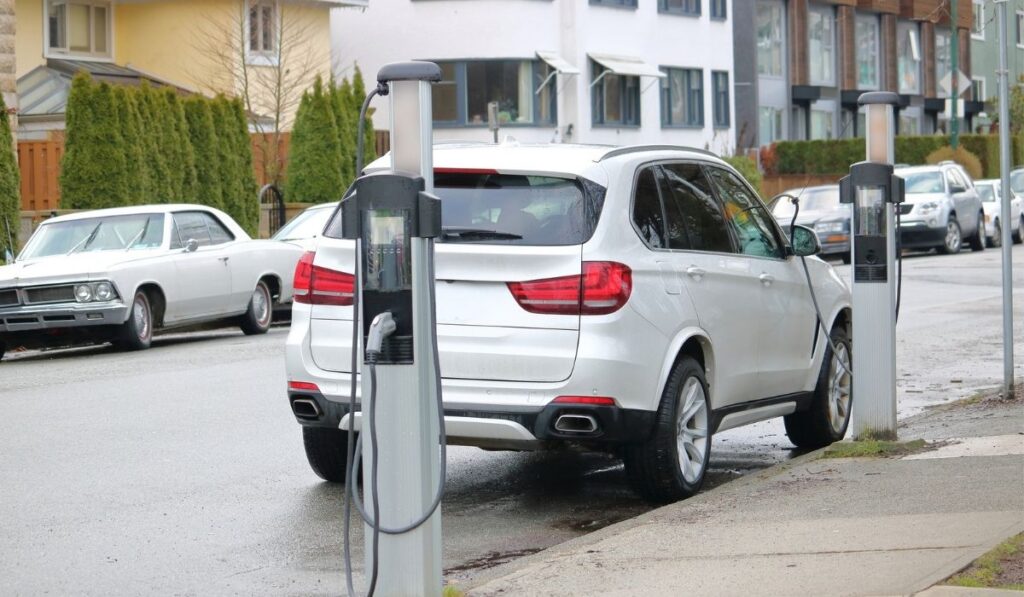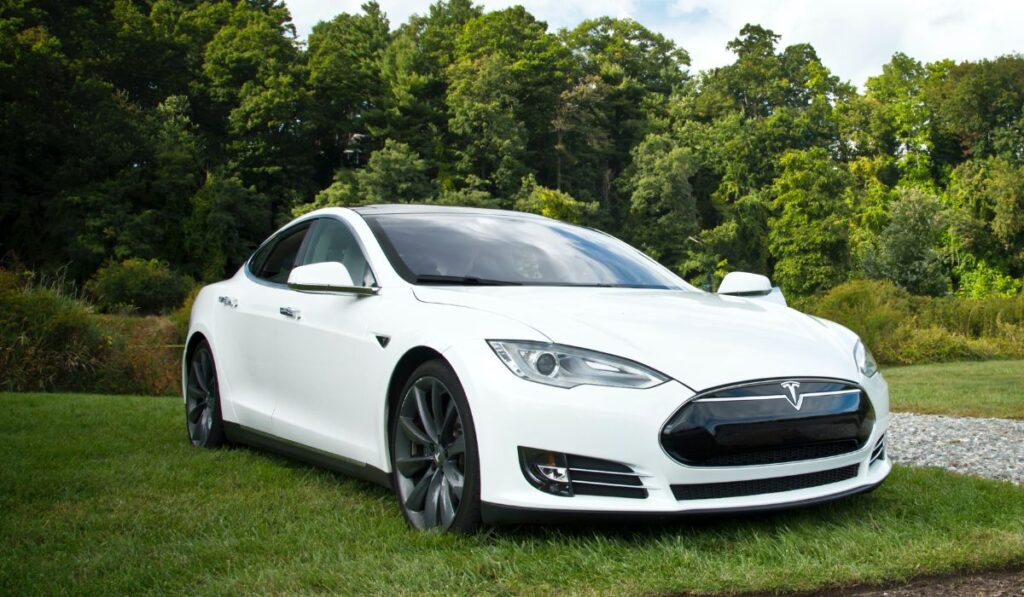If you’re a new electric car owner, you may be wondering how to measure the vehicle’s performance and efficiency. After all, gas-powered vehicles have fuel economy indicators — like miles per gallon — that we’re accustomed to, but what about electric vehicles?
MPGe stands for “miles per gallon of gasoline-equivalent” and is the electric equivalent of measuring how many miles a vehicle can travel on one gallon of gasoline. It’s measured as how much electric power your car needs to travel 100 kilometers and is measured in kWh per 100 miles.
Let’s explore everything you need to know about MPGe, including how it’s calculated and how to use it to measure your electric vehicles’s efficiency.
What Is MPGe?

MPGe refers to “miles per gallon of gasoline-equivalent,” or MPG for electric vehicles, plug-in hybrids, and other alternative fuel vehicles. If you have an electric vehicle (EV), you’ll need to understand what MPGe is in order to calculate the overall energy consumption of your vehicle.
The miles per gallon, or MPG, of gasoline-powered automobiles, is one of the criteria used to compare the fuel efficiency of similar vehicles. But for electric cars, you can’t use any measuring parameter that is used for vehicles running on fuel.
The Environmental Protection Agency therefore introduced (EPA) MPGe as an acronym for “miles per gallon equivalent,” in 2010.
How Is MGPe Calculated?
The EPA utilizes the MPGe to measure the exact quantity of electric energy required to produce one gallon of gasoline. Similarly, different electric car manufacturers determine the MPGe of their vehicles by calculating the energy consumption per mile.
The manufacturer can do this by converting the native units into a gasoline energy equivalent. The conversion mechanism requires sophisticated computer modeling or a real driving cycle.
In traditional gas vehicles, fuel combustion produces heat, but in an electric car, the electrical energy results in the production of heat. This is the reason why MPGe is effectively the heat equivalent of MPG.
The goal of developing MPGe was to compare the energy consumption of conventional gas-powered automobiles with that of alternative-fuel vehicles.
If you’re looking for an electric car or a plug-in hybrid, you may also find the MPGe mentioned alternatively as kWh per 100 miles. This measurement system helps you to calculate how much electrical power your car needs to travel 100 kilometers.
In simple terms, it tells you how much power the battery is utilizing.
When comparing MPGe, a higher number is always considered to be better. However, when the ranges of different cars are compared, then those with lower numbers are considered to be more efficient.
Is MPGe an Accurate Way to Measure Mileage?
The traditional MPG calculation counts the distance your car can cover on a single tank of fuel. The term MPGe is a more accurate approach to evaluating energy consumption because alternative fuel cars don’t always require gas to run.
The MPGe calculates the quantity of energy that the owner will most likely use. This calculation is made by comparing the tank-to-wheel consumption of liquid fuel and the wall-to-wheel consumption of an electric car.
The MPGe rating of a battery-powered vehicle is based on the distance it covers per unit of energy. This is why MPGe is a more accurate way to measure mileage.
Unlike conventional MPG values, this number will appear on the window sticker for EVs and plug-in hybrids.
Which Electric Cars Have the Best MPGe?

Initially, many electric cars that were launched received criticism for their low range. Most early electric cars had a sub-100-mile driving range.
However, modern electric cars have improved significantly in terms of mileage and energy efficiency and are now neck and neck with gas-powered vehicles. Many models are as powerful, fast, and efficient as any other standard vehicle with a fuel engine.
Here are the electric cars with the best MPGe:
The 2022 Tesla Model 3 RWD: 25kWh
The 2022 Tesla Model 3 is the most efficient EV in 2022. It has an MPGe of 25kWh per 100 miles.
The Model 3 is also more affordable compared to other Tesla models. If you want a fast car with good energy efficiency, then this model is the best choice for you.
The 2022 Lucid Air Grand Touring w/19-inch wheels: 26 kWh
The Lucid Air is comparatively new to the EV market, and the luxury sedan has an energy rating of 26 kWh per 100 miles, making it a close competitor to Tesla’s Model 3. However, you may prefer the Lucid Air for its driving range, which is twice that of some Teslas.
The 2022 Chevrolet Bolt EV: 28kWh
While Chevrolet’s 2022 upgraded Bolt EV came out with a bang, the celebration was short-lived. Soon after, the vehicle had to be recalled because of a fire risk because of the car’s battery pack.
However, it still has a decent MPGe and is more efficient than the Tesla Model 3.
The 2022 Hyundai Kona EV: 28 kWh
The Kona Electric Car is an SUV that only comes with FWD. It has an MPGe rating of 28 kWh per 100 miles with a 258-mile range and the motor produces 136PS and 395 Nm of torque.
If you’re a speed lover, then this car is ideal as it has a zero to 100km springtime of 9.7 seconds!
The 2022 Tesla Model S: 28 kWh
Tesla makes the list again with its 2022 Model S. The Tesla 2022 Model S is known for its improved efficiency and the amount of energy that’s required to travel 100 miles has been reduced from 38 kWh to 28 kWh.
There’s also been an interior upgrade with a new dashboard layout and steering yoke. The 2022 Model S offers 405 miles of range.
2022 Tesla Model Y Long Range: 28 kWh
The Model Y luxury compact SUV, like the Model S, has an MPGe of 28 kWh per 100 miles. Its estimated driving range is 330 miles.
While this car does hold back in terms of acceleration, it makes up for it through its speed. It’s also smoother and offers you better value for money, even though it has some reported smartphone integration problems.
The 2022 Chevrolet Bolt EUV: 29 kWh
The 2022 Chevrolet Bolt has a 247-mile range with an MPGe rating of 29 kWh per 100 miles. It has all the qualities needed in an electric car, including lots of space, quick acceleration, and an acceptable driving range.
However, many EVs, such as the Ford Mustang Mach-E and Tesla Model Y, offer a longer drive range.
